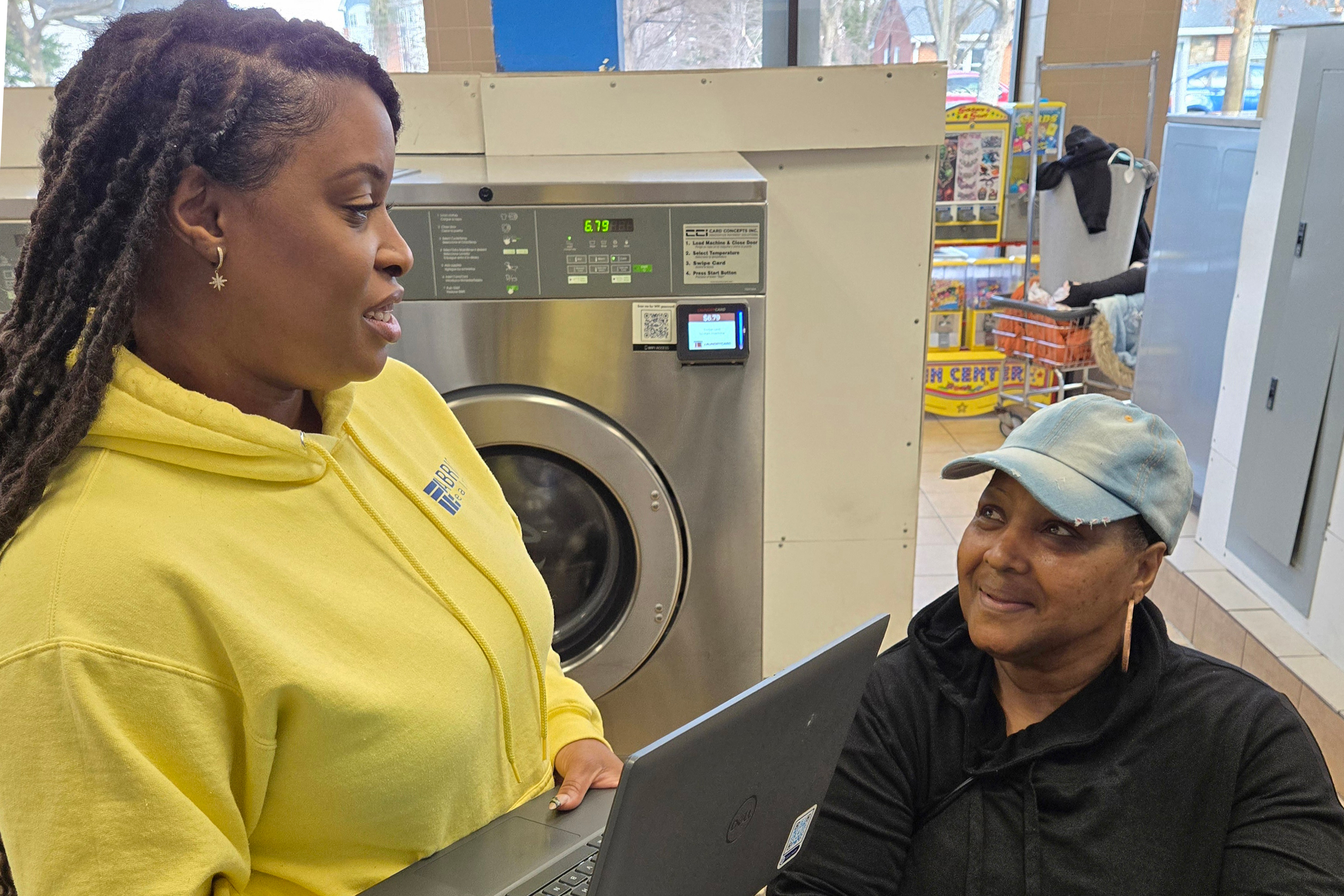SUITLAND, Md. — At a SuperSuds Laundromat just south of Washington, D.C., a steady stream of customers loaded clothes into washers and dryers on a recent Sunday morning, passing the time on their phones or watching television.
Amid the low hum of spinning clothes, Adrienne Jones made the rounds in a bright yellow sweatshirt, asking customers about their health needs. “Do you have health coverage?” Jones, an outreach manager for Fabric Health, asked Brendan Glover, 25, who was doing laundry with his toddler in tow.
Glover works in law enforcement, but he lost his coverage in 2024 when a job ended. “I am young, so I don’t think about it, but I know I will need it,” he said.
Jones collected his contact information, gave him a gift card for a future laundromat visit, and promised to help him find affordable coverage.
State Medicaid and Affordable Care Act coverage programs have long struggled to connect with lower-income Americans to help them access health care. They send letters and emails, place phone calls, and post on social media platforms such as Facebook and X.
Some of these state programs are trying an alternative approach: meeting people at the laundromat — where they regularly go and usually have time to chat.
Fabric Health, a Washington, D.C.-based startup, sends outreach workers into laundromats in Maryland, Pennsylvania, New Jersey, and — as of January — the District of Columbia, to help people get and use health coverage, including by helping schedule checkups or maternity care. The workers, many of whom are bilingual, visit the laundromats also to establish relationships, build trust, and connect people with government assistance.
Medicaid health plans including those run by CareFirst BlueCross BlueShield in Maryland, UPMC in Pittsburgh, and Jefferson Health in Philadelphia pay Fabric Health to connect with their enrollees. The company was paid by the Maryland Managed Care Organization Association, the state’s Medicaid health plan trade group, to help people recertify their Medicaid eligibility after covid pandemic-era coverage protections expired.
Since 2023, the company has connected with more than 20,000 people in Maryland and Pennsylvania alone, collecting contact information and data on their health and social needs, said Allister Chang, a co-founder and the chief operating officer. Chang also serves on the D.C. State Board of Education as Ward 2’s elected representative.
Fabric Health would not disclose its fees to KFF Health News. The company is structured as a public benefit corporation, meaning it is a for-profit business created to provide a social benefit and is not required to prioritize seeking profits for shareholders.
Pennie, Pennsylvania’s ACA marketplace, which opened in 2020, pays Fabric Health to talk to people in the Philadelphia and Pittsburgh areas about coverage options and enroll them.
A survey last year found that two-thirds of uninsured people in the state have never heard of Pennie, said Devon Trolley, Pennie’s executive director.
“Fabric’s approach is very novel and creative,” she said. “They go to where people are sitting with time on their hands and develop grassroots relationships and get the word out about Pennie.”
For enrollees, the laundromat chats can be easier and quicker than connecting with their health plans’ customer service. For the health plans, they can increase state performance payments, which are tied to enrollee satisfaction and effectiveness at getting them services such as cancer screenings.
“Our pitch is: People spend two hours a week waiting around in laundromats and that idle time can be incredibly productive,” said Courtney Bragg, a co-founder and the CEO of Fabric Health.
CareFirst began working with the company last year to help people in Maryland renew coverage, schedule checkups, and sign up for other benefits including energy assistance and food stamps.
Sheila Yahyazadeh, chief external operations officer for the CareFirst plan, said the initiative shows the importance of human interaction. “There is a misconception that technology will solve all, but a human face is absolutely fundamental to make this program successful because at the end of the day people want to talk to someone and feel seen and cared for,” she said.
On a previous visit to SuperSuds, Jones, the Fabric Health outreach worker, met Patti Hayes, 59, of Hyattsville, Maryland, who is enrolled in the Medicaid health plan operated by CareFirst but had not seen a primary care physician in over a year. She said she preferred to see a Black physician.
After they met at the laundromat, Jones helped her find a new doctor and schedule an appointment. She also helped her find a therapist in her plan’s network.
“This is helpful because it’s more of a personal touch,” Hayes said.

Fabric Health also texts people to stay in touch and tell them when the outreach workers will be back at their laundromat so they can meet again in person.
Paola Flores, 38, of Clinton, Maryland, told a Fabric Health worker she needed help switching Medicaid plans so she could get better care for her autistic child. Communicating with her in Spanish, the worker said she would help her, including by making an appointment with a pediatrician.
“Good help is hard to find,” Flores said.
Ryan Moran, Maryland’s Medicaid director, said Fabric Health helped keep people enrolled during the Medicaid “unwinding,” when everyone on the program had to get renewed after the expiration of pandemic-era coverage protections that lasted three years.
Outreach workers there focused on laundromats in towns that had high rates of people being disenrolled for paperwork reasons.
“There is no question about the value of human-to-human interaction and the ability to be on the ground where people are, that removes barriers and gets people to engage with us,” Moran said.

